
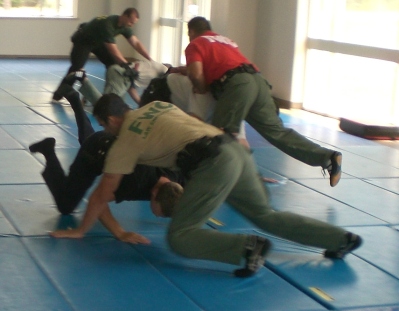
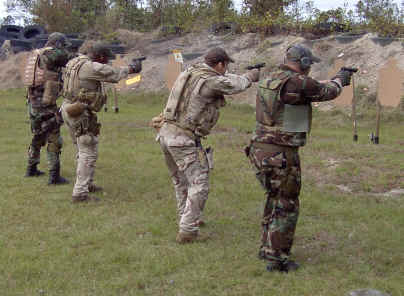
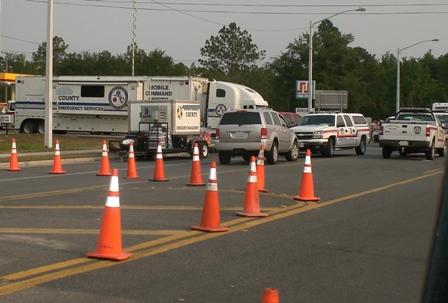
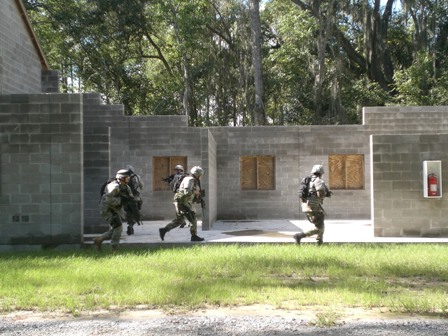
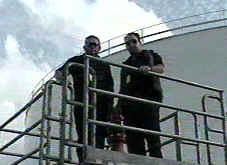
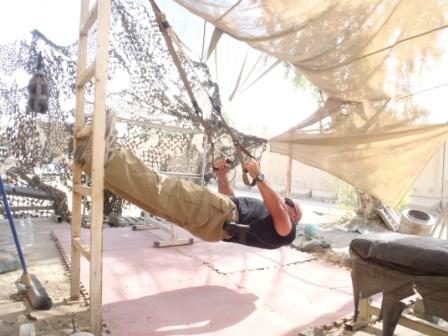

Law enforcement aims to sharpen skills
By JUSTIN LANG jlang@lakecityreporter.com
Tuesday, March 22,
2005 11:08 PM EST
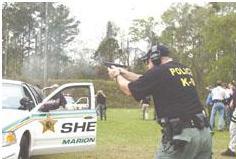
On the south end of the Lake City Community College campus
Tuesday several law enforcement officers from various agencies and the U.S.
military jumped out of their vehicles and open-fired on their
"targets." With the threats quickly eliminated, their firearms were
soon back in their holsters as smoke hung in the air, and empty shell casings
laid scattered across the ground. Though real bullets were used, nobody was in danger. It was
part of a two-day "Vehicular Combative Course" training seminar
helping law enforcement professionals with tactics for survival when taking
fire while inside their vehicle. "It gets them in the mindset that their vehicle is not
necessarily a safe haven," said Russ Adler, executive director of
locally-based Adler and Associates International, which is teaching the course.
The event is funded through the Florida Department
of Law
Enforcement's Criminal Justice Standards and Training Commission trust
fund. Adler's is a local firm that helps train military and law
enforcement professionals using a variety of advanced survival and
combat
tactics. He said the vehicular combative course is a component of the
company's
Fighting and Survival Tactics series, or FAST. Because of the training being paid for by the FDLE, he said
it allows many law enforcement agencies, especially those with small budgets,
to give their officers free advanced training beyond what they would find
elsewhere.
However, the local course, which continues through today at
LCCC, drew participants from both the military and law enforcement. They were
from across the state and even some out-of-state. Doug Byrd, a patrol officer for the Ridgeland Police
Department in Ridgeland, S.C., said the course is "good training." Himself an instructor for similar training, Byrd said he
made the drive from South Carolina to participate in the LCCC course because of
the "real-world traing." Byrd said by having to exit the vehicle under the premise of
being shot at and returning fire on the move, it's more like "real-world
situations," as opposed to just standing still and firing at a target.
Robert Runnells, a Levy County Sheriff's Office deputy and
SWAT team member, has been through three of Adler's courses and considered it
"excellent training." Runnells, who was recently involved in a shooting, said the
repetition of doing the drills over and over again is similar to training used
by SWAT teams. However, he said, most regular law enforcement officers don't
receive the training, even though the threat of being shot at while in a patrol
vehicle is a possibility. Learning that their vehicle is a "bullet magnet"
is the entire point of the training, Adler said.
Several members of U.S. Air Force Security Forces from
Mississippi were among those training at LCCC Tuesday. Though they receive extensive military training, Staff Sgt.
James Boyd said, "I would classify this more as proficiency training in
that it allows us to stay proficient." For military police, Boyd also said the training is useful
either in a normal law enforcement capacity or in combat. "If you look at what is going on in the desert, we
could utilize it there or we can utilize it in our stateside positions,"
he said.
One of Adler's instructors for the training session was Bud
Deese, a former corrections officer and retired National Guardsman with a
special forces background. Deese said because it is offered by private industry, the
training has the flexibility to teach tactics that are often lost in a bevy of
requirements imposed on the military and law enforcement agencies. Today the training will continue with the participants
learning, among other things, how to shoot through a windshield and some
hand-to-hand combat. Though live rounds were being used, Adler stressed and
maintained an atmosphere of safety with everyone using safety glasses, ear plugs
and practicing "extreme muzzle discipline." Adler said the kind of advanced training being used has been
available since the late 1980s, but is just now being delivered widely to law
enforcement.

March 25. 2005
Some tricks of the
trade
By KAREN VOYLES
Sun staff writer
One officer after another jumped out of a patrol car and
used hand-to-hand fighting to try to control a situation before pulling out a
handgun and firing up to six rounds in the direction of the suspects a few feet
away. The scenario was made up. The suspects were cardboard
targets. The officers were seasoned professionals from local, state and federal
agencies. "And this is the kind of thing that can happen any day,
anywhere, to any officer," said Russ Adler of Adler and Associates
International, the firm that offered a two-day course this week on how to
survive scenarios involving squad cars - the place where many law enforcement
officers spend most of their on-duty time. "We want to show these officers how they can take
control of scenarios involving vehicles," Adler said, including how to get
out of either side of the vehicle ready to shoot with a long-barreled gun like
a shotgun and how to handle a combative suspect inside a squad car.
"That's something that troopers can run into because a
lot of times they put suspects in the front seat of their vehicles to question
them and then that suspect turns on the trooper," Adler said. "And
what we stress is not to do both at once. If you are going fight, then fight, but
if you are going to drive, just drive." Officers also learned how to shoot through a windshield and
fire weapons from a seated position. "These officers know that their vehicle is really a
bullet-magnet," Adler said. "Someone shooting at something will aim
at that car because it will probably be the biggest thing around and it's
really apparent what it is."
Among those attending was a Levy County sheriff's deputy who
was recently involved in the shooting of a civilian. Deputy Robert Kerry Runnels' actions in the February
shooting death of Matthew Lee Arthur were ruled a justifiable homicide by a
grand jury. Runnels shot Arthur after Arthur reached into his own truck and
picked up a rifle, according to reports. Investigators who were assigned to the case said Runnels and
his supervisor, Sgt. Danny Lee Turner, made nearly ideal decisions in an
extraordinarily stressful situation, using non-lethal force three times in
trying to subdue Arthur and not shooting until he was raising his rifle toward
the deputies.
"Any training you can get is helpful because it
involves repetition and the more you do something, the better you get at,"
said Runnels, who also is a SWAT team member in Levy County.
The course was held at the firing range of the Criminal
Justice Training Center at Lake City Community College. The class drew 18 students, including seven law enforcement
officers from the U.S. Air Force who are stationed in Mississippi, as well as
an officer from the Florida Department of Environmental Protection, police
officers from Gainesville and from South Carolina, and deputies from Levy and
Marion counties. "We like to go to different schools and learn different
techniques, then take a little from each one to use," Gainesville Police
Department Cpl. John Nabet said.
Karen Voyles can be reached at (352) 486-5058 or
voylesk@gvillesun.com.
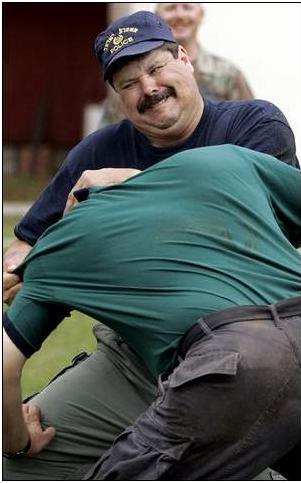
Photos by TRACY WILCOX/The Gainesville Sun
Tom DeMaio of Hunter Army Airfield in Savannah, Ga., takes
down Paul Delgado of the Department of Environmental Protection during
hand-to-hand combat training at Lake City Community College on Wednesday









